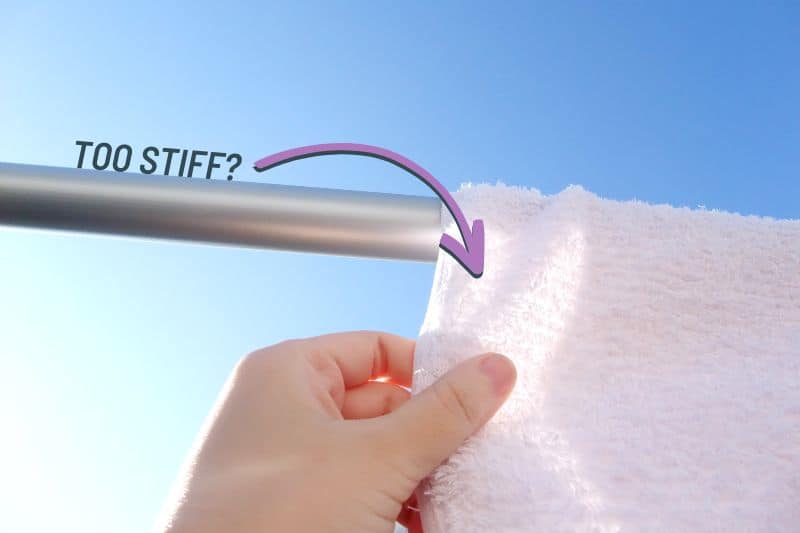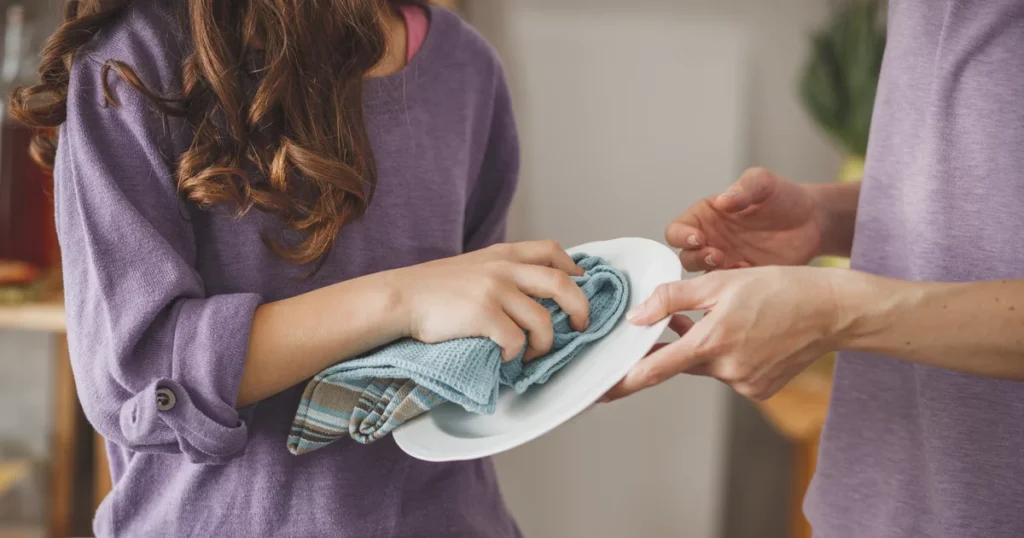There are a few things that can make kitchen towels hard. Taking care of these things will help them stay soft. Kitchen towels go through various activities in the kitchen, from cooking, packing, and cleaning to drying, decorating, and covering. So they became so hard and untidy, but there are many techniques to resolve this problem.
Table of Contents

A kitchen towel might get stiff for the following reasons:
Dish soap residue
If you wash your kitchen towels with too much soap or fabric softener, it can leave behind a residue that makes the towels feel stiff. Follow the directions for how much soap to use, and think about using less or not using fabric softener at all.
Hard Water
If your water is hard, which means it has a lot of minerals in it, like calcium and magnesium, it can change the way your clothes feel. Over time, the minerals can build up and make the towels feel rough. You can fix this problem by using a water softener or adding vinegar to the wash.
Over-drying
Putting towels in a hot dryer for too long can make the natural fibers less soft. If you don’t want your towels to be too dry, dry them on the line or use a lower heat setting on your machine.
Quality of the towel
When it comes to towels, the quality of the towels can make a difference. Towels that aren’t very good might lose their softness faster. You can get softer and longer-lasting towels if you buy better towels made from materials like Egyptian or Pima cotton.
Too much washing
Towels can get stiff if they are washed too often, especially if harsh chemicals or hard water are used. They will stay soft longer if you wash them when they’re not too dirty.
Not Using Enough Fabric Softener
Using too much fabric softener can make towels stiff, but using just the right amount can help them stay smooth. It has been said that adding vinegar to the washing cycle can also soften clothes naturally.
To keep your kitchen towels from getting too hard, it’s important to follow the care instructions, use the right amount of soap, dry them just right, and fix any problems with the water quality. Buying high-quality towels and using fabric softener every once in a while can also help them keep their soft and absorbent qualities.
Is it safe to use kitchen towels on food?
It’s okay to use kitchen towels on food as long as they are clean and haven’t been used to clean up anything dangerous.

There are, however, some things to think about:
Cleanliness
Make sure the cooking towels are clean and haven’t been used to wipe down chemicals, cleaners, or other things that aren’t safe for food. Kitchen towels stay clean longer if you wash them often in hot water with soap.
Contamination
Watch out for cross-contamination. If you clean up raw meat juices or other things that could be harmful with a kitchen towel, you shouldn’t use that same towel to wipe down areas that will be touching ready-to-eat food. It might help stop the spread of germs if you do this.
Make of the Towel
The cooking towel’s make is important. Most people think it’s safe to use towels made from natural fibers like cotton around food. Do not use towels made of synthetic materials or that have been treated with chemicals that could be bad for you if they touch food.
Washing Often
Kitchen towels should be washed often, especially if they touch food. This helps get rid of germs and keeps the towels clean and safe to use.
Separate Towels for Different Jobs
For different jobs in the kitchen, you might want to use different towels. For instance, have different towels for wiping down counters, cleaning hands, and handling food. Cross-contamination is less likely to happen this way.
Remember that it can help keep you from getting germs by using disposable paper towels for some jobs, especially those that involve raw meat. If you are worried about the safety of your kitchen towels, you may also decide to only use certain towels for tasks that come into close contact with food.
To keep your kitchen and the food you prepare safe, always follow good food safety practices like washing your hands often, wiping down surfaces, and using different tools for handling raw and cooked foods.
What is the best way to wash a kitchen towel?
Washing kitchen towels properly is important to maintain their cleanliness and effectiveness.

Here are some general guidelines for washing kitchen towels:
Separate Towels
Separate kitchen towels from other laundry items, especially clothing items that may contain lint. Washing towels separately helps maintain their absorbency.
Pre-treat Stains
If your kitchen towels have stains, pre-treat them before washing. You can use a stain remover or a mixture of baking soda and water to treat stains. Follow the product’s instructions for the best results.
Use Hot Water
Washing kitchen towels in hot water helps kill bacteria and remove grease effectively. However, check the care instructions on the towels, as some materials may require cold or warm water to prevent damage.
Use a mild deterrent.
Choose a mild detergent to avoid residue buildup that can make towels stiff. Avoid using excessive amounts of detergent, as this can contribute to stiffness as well. Follow the recommended amount on the detergent packaging.
Avoid Fabric Softeners
While fabric softeners can make towels feel softer, they can also reduce absorbency over time. It’s generally advisable to skip fabric softeners when washing kitchen towels.
Vinegar Rinse
Adding white vinegar to the rinse cycle can help remove detergent residue and keep towels soft. About half a cup of vinegar added to the rinse cycle is usually sufficient.
Dry Promptly
Promptly remove the towels from the washing machine after the cycle is complete to prevent the growth of mildew. If using a dryer, avoid over-drying, as this can make towels stiff. If possible, line drying is a gentler option.
Regular Cleaning
Wash kitchen towels regularly, especially if they come into contact with food or other potentially harmful substances. Regular washing helps maintain cleanliness and prevents the growth of bacteria.
Check Care Labels
Always check the care labels on your kitchen towels for any specific washing instructions or restrictions. Some towels may have special care requirements based on the materials they are made from.
By following these guidelines, you can keep your kitchen towels clean, soft, and effective in their various tasks. Regular maintenance and proper washing practices contribute to the longevity and performance of your towels.
want to buy towel click here